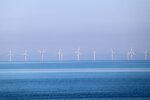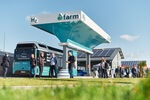08/09/2010
USA - 300 GW of wind power capacity is in planning
At the end of 2009, even after reforms by a number of ISOs, RTOs, and utilities to reduce the number of wind projects in their queues, there were roughly 300 GW of wind power capacity within the interconnection queues.
One visible testament to the increased interest in wind energy is the amount of wind power capacity currently working its way through the major transmission interconnection queues across the country.
The queues surveyed include PJM Interconnection, Midwest Independent System Operator (MISO), New York ISO, ISO-New England, California ISO, Electricity Reliability Council of Texas (ERCOT), Southwest Power Pool (SPP), Western Area Power Administration (WAPA), Bonneville Power Administration (BPA), Tennessee Valley Authority (TVA), and 23 other individual utilities.
To provide a sense of sample size and coverage, the ISOs, RTOs, and utilities whose queues are included here have an aggregated peak demand of almost 70% of the U.S. total. Figures 7 and 8 only include projects that were active in the queue at the end of 2009 but that had not yet been built; suspended wind farm projects are not included.
These data should be interpreted with caution: though placing a wind farm project in the interconnection queue is a necessary step in project development, being in the queue does not guarantee that a project will actually get built. In fact, there is a growing recognition that many of the wind farm projects currently in interconnection queues are very early in the development process.
As a result, efforts have been and are being taken by the Federal Energy Regulatory Commission (FERC), ISOs, RTOs, and utilities to reduce the number of speculative projects that have – in recent years – clogged these queues.
Even with this important caveat, the amount of capacity in the nation’s interconnection queues still provides at least some indication of the amount of wind power development that is in the planning phase.
At the end of 2009, even after reforms by a number of ISOs, RTOs, and utilities to reduce the number of wind projects in their queues, there were roughly 300 GW of wind power capacity within the interconnection queues reviewed for this report – nearly nine times the installed wind power capacity in the United States.
This wind power capacity represented almost 60% of all generating capacity within these selected queues at that time, and was nearly three times as much capacity as the next-largest resource in these queues, natural gas.
Much of this wind power capacity is planned for the Midwest, Mountain, Texas, PJM, SPP, and Northwest regions: wind power projects in the interconnection queues in these regions account for 93% of the aggregate 303 GW of wind power in the selected queues.
At the other end of the spectrum, smaller amounts of wind power capacity are represented in the interconnection queues of the California ISO (3.4%), New York ISO (2.3%), ISO-New England (1.2%), and the Southeast (0.1%).
As another data point, the North American Electric Reliability Corporation (NERC) finds that roughly 210 GW of new wind power capacity is planned for construction over the next ten years in the United States.
Once again, though, it is unlikely that all of these planned projects will ultimately come to fruition within this time frame. As a measure of the near-term development pipeline, Ventyx (2010) estimates that – as of late-July 2010 – more than 31 GW of wind power capacity was either under construction or in site preparation (5 GW of the 31 GW total), in-development and permitted (12 GW of the 31 GW), or in-development with pending permit and/or regulatory applications (the remaining 14 GW of the 31 GW total). AWEA, meanwhile, identified 5,700 MW of wind power projects that were under construction as of mid-2010.
General Electric (GE) remained the number one manufacturer of wind turbines supplying the U.S. market in 2009, with 40% of domestic turbine installations (down slightly from 43% in 2008, 45% in 2007, and 47% in 2006).
Following GE were Vestas (15%), Siemens (12%), Mitsubishi (8%), Suzlon (7%), Clipper (6%), Gamesa (6%), REpower (3%), Acciona (2%), and Nordex (1%). Other utility-scale (>100 kW) wind turbines installed in the United States in 2009 (and that fall into the “Other” category in Figure 9) include turbines from NedWind (6.5 MW), AAER (6 MW), DeWind (6 MW), Fuhrlander (4.5 MW), Goldwind (4.5 MW), RRB (2.4 MW), Elecon (0.6 MW), and Wind Energy Solutions (0.25 MW).
On a worldwide basis, more than 38,000 MW of wind power capacity was added in 2009, the highest volume achieved in a single year, and up from about 28,000 MW in 2008, bringing the cumulative total to approximately 160,000 MW.
In terms of cumulative installed wind power capacity, the United States ended the year with 22% of total worldwide capacity, and is the leading market in the world by this metric. Over the past 10 years, cumulative wind power capacity has grown an average of 30% per year in the United States, slightly higher than the 28% growth rate in worldwide capacity.
After four years of leading the world in annual wind power capacity additions, the U.S. dropped to second place in 2009, capturing roughly 26% of the worldwide market (behind China’s 36% market share7), down from 29% in 2008 and 27% in 2007. Spain, Germany, and India rounded out the top five countries in 2009 for annual capacity additions.
For more information please contact Trevor Sievert at ts@windfair,net
One visible testament to the increased interest in wind energy is the amount of wind power capacity currently working its way through the major transmission interconnection queues across the country.
The queues surveyed include PJM Interconnection, Midwest Independent System Operator (MISO), New York ISO, ISO-New England, California ISO, Electricity Reliability Council of Texas (ERCOT), Southwest Power Pool (SPP), Western Area Power Administration (WAPA), Bonneville Power Administration (BPA), Tennessee Valley Authority (TVA), and 23 other individual utilities.
To provide a sense of sample size and coverage, the ISOs, RTOs, and utilities whose queues are included here have an aggregated peak demand of almost 70% of the U.S. total. Figures 7 and 8 only include projects that were active in the queue at the end of 2009 but that had not yet been built; suspended wind farm projects are not included.
These data should be interpreted with caution: though placing a wind farm project in the interconnection queue is a necessary step in project development, being in the queue does not guarantee that a project will actually get built. In fact, there is a growing recognition that many of the wind farm projects currently in interconnection queues are very early in the development process.
As a result, efforts have been and are being taken by the Federal Energy Regulatory Commission (FERC), ISOs, RTOs, and utilities to reduce the number of speculative projects that have – in recent years – clogged these queues.
Even with this important caveat, the amount of capacity in the nation’s interconnection queues still provides at least some indication of the amount of wind power development that is in the planning phase.
At the end of 2009, even after reforms by a number of ISOs, RTOs, and utilities to reduce the number of wind projects in their queues, there were roughly 300 GW of wind power capacity within the interconnection queues reviewed for this report – nearly nine times the installed wind power capacity in the United States.
This wind power capacity represented almost 60% of all generating capacity within these selected queues at that time, and was nearly three times as much capacity as the next-largest resource in these queues, natural gas.
Much of this wind power capacity is planned for the Midwest, Mountain, Texas, PJM, SPP, and Northwest regions: wind power projects in the interconnection queues in these regions account for 93% of the aggregate 303 GW of wind power in the selected queues.
At the other end of the spectrum, smaller amounts of wind power capacity are represented in the interconnection queues of the California ISO (3.4%), New York ISO (2.3%), ISO-New England (1.2%), and the Southeast (0.1%).
As another data point, the North American Electric Reliability Corporation (NERC) finds that roughly 210 GW of new wind power capacity is planned for construction over the next ten years in the United States.
Once again, though, it is unlikely that all of these planned projects will ultimately come to fruition within this time frame. As a measure of the near-term development pipeline, Ventyx (2010) estimates that – as of late-July 2010 – more than 31 GW of wind power capacity was either under construction or in site preparation (5 GW of the 31 GW total), in-development and permitted (12 GW of the 31 GW), or in-development with pending permit and/or regulatory applications (the remaining 14 GW of the 31 GW total). AWEA, meanwhile, identified 5,700 MW of wind power projects that were under construction as of mid-2010.
General Electric (GE) remained the number one manufacturer of wind turbines supplying the U.S. market in 2009, with 40% of domestic turbine installations (down slightly from 43% in 2008, 45% in 2007, and 47% in 2006).
Following GE were Vestas (15%), Siemens (12%), Mitsubishi (8%), Suzlon (7%), Clipper (6%), Gamesa (6%), REpower (3%), Acciona (2%), and Nordex (1%). Other utility-scale (>100 kW) wind turbines installed in the United States in 2009 (and that fall into the “Other” category in Figure 9) include turbines from NedWind (6.5 MW), AAER (6 MW), DeWind (6 MW), Fuhrlander (4.5 MW), Goldwind (4.5 MW), RRB (2.4 MW), Elecon (0.6 MW), and Wind Energy Solutions (0.25 MW).
On a worldwide basis, more than 38,000 MW of wind power capacity was added in 2009, the highest volume achieved in a single year, and up from about 28,000 MW in 2008, bringing the cumulative total to approximately 160,000 MW.
In terms of cumulative installed wind power capacity, the United States ended the year with 22% of total worldwide capacity, and is the leading market in the world by this metric. Over the past 10 years, cumulative wind power capacity has grown an average of 30% per year in the United States, slightly higher than the 28% growth rate in worldwide capacity.
After four years of leading the world in annual wind power capacity additions, the U.S. dropped to second place in 2009, capturing roughly 26% of the worldwide market (behind China’s 36% market share7), down from 29% in 2008 and 27% in 2007. Spain, Germany, and India rounded out the top five countries in 2009 for annual capacity additions.
For more information please contact Trevor Sievert at ts@windfair,net
- Source:
- Online Editorial, www.windfair.net
- Author:
- Posted by Trevor Sievert, Online Editorial Journalist
- Email:
- ts@windfair.net
- Link:
- www.windfair.net/...
- Keywords:
- Wind energy, wind power, wind turbine, wind mill, offshore, onshore, wind farm, renewable energy


























